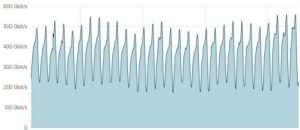It might be the core season for holidays in northern hemisphere, but the data throughput at the DE-CIX Internet Exchanges keeps on growing. Typically, it is odd to see traffic spikes in the middle of summer, when people tend to be more outdoorsy. But in addition to the entertainment side of Internet use, for example, worldwide software updates rolled out simultaneously are a significant driver of data throughput. Here is the roundup of the bigger peaks from the past few months.
Dallas 560.17 Gbps
DE-CIX Dallas reached 300 Gigabit per second (Gbps) late last year and the traffic as well as the number of connected networks continues to grow. The 500 Gbps line was crossed back in June and now we are already at 594 Gbps. The exchange connects over 100 networks and ranks among the top 20 largest Internet Exchanges in the US.
Frankfurt 12.43 Tbps
At the end of August, Frankfurt had a new record of 12.8 Terabits per second (Tpbs). With this new record, data traffic at the exchange has already increased by 18% this year and by as much as 50% since the start of 2020. Giving the number a real-life example, 12 Tbps is as much as 2.64 million HD-quality videos streamed simultaneously.
Hamburg 280.2 Gbps
Hamburg has been enjoying steady growth both in terms of traffic and the number of connected networks. Last year, we changed over from the old /24 network to a new bigger /23 network and the customer bandwidth increased by 40%. This week, the exchange reached a new peak of 280.2 Gbps.
Marseille 170.16 Gbps
Back in January, DE-CIX Marseille crossed the 150 Gbps and we are now at 203 Gbps just eight months on. Last year, the exchange had significant growth of almost 70% in connected capacity and 9% in connected networks. Due to the intercontinental cables landing in the region, we have an interesting mix of international networks connected in Marseille: just over a third of the networks originate from Europe, slightly less from the US and then 12%, 10%, and 7% from Asia, the Middle East, and Africa respectively.
DE-CIX provides premium interconnection services and operates several carrier and data center neutral Internet Exchanges in Europe, the Middle East, North America, Asia, and Africa. Its sole shareholder is the eco Association.




